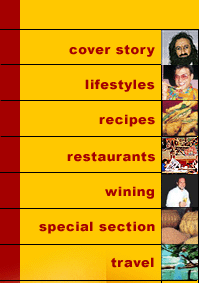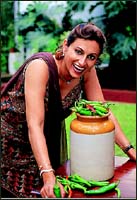


 Pickle Queen Comes Calling
Pickle Queen Comes CallingIt might sound like taking coal to Newcastle, but that is what UK�s Pickle Queen, MEENA PATHAK of the famous Patak�s Indian spices, is doing. She�s planning on bringing her pickles, pastes, chutneys, and cooking sauces to India. FARZANA CONTRACTOR met and interviewed India�s original Spice Girl. |
|
MEENA Pathak of Lancashire, England, is the original Indian spice girl. Of this I am convinced. It is hard not to be when Meena is sitting across me with a pickle jar full of the hottest-looking green chillies I have ever seen... and she is popping them into her mouth one after another, as I might have a handful of After Mints post-dinner. I count eight she has eaten and call for her to halt. Just watching her is giving me ulcers. And I marvel that Meena has been doing this for years and continues to look the way she does. Which is, well, hot! She is the late Lakhubhai Pathak�s daughter-in-law, and I�m afraid, this is how Meena will be referred to for some time to come. Lakhubhai�s is a familiar name in India. Not because of his world-famous pickles that sell in 50 countries under the brand name �Patak�. But because he is credited with the dubious distinction of helping dismiss Narasimha Rao�s government in the mid-Nineties and tossing Godman Chandra Swami in jail over some financial scam involving his hard-earned money. Though keeping Lakhubhai and the Pathak family name aside, Meena has done enough on her own to be proud of. She�s singularly responsible, the English press of London says, for the �happening� of Indian food in UK. And the Queen Mother, no doubt recognising this great enterprise, rewarded Meena with the prestigious Order of the British Empire two months ago. Meena tells me, �I�m no Dame, there�s no peerage involved with this title, so I�m just Meena Pathak, OBE. I never expected to get the title, especially since my husband got it four years ago, and I didn�t think they give it to two members in one family.� Her husband is Kirit Pathak, the late Lakhubhai�s son, and the man who came down to Bombay in 1976, took one look at Meena who was then working for the Oberoi Hotels, and decided that he wanted to marry her. Though she agreed to the match, Meena had absolutely no idea who Kirit Pathak was, and what was his business in UK. She tells the story simply, matter-of-factly: �In November 1976, after a huge and grand wedding in Bombay, I flew back with my husband to this little village called Merseyside near Oxford in North Hampshire. It was winter and the place was wet, damp and mucky. By 3 o�clock in the afternoon, it got dark, and my in-laws had a cottage that was in the middle of nowhere. I knew that the Pathaks were a big name in UK, but unfortunately, their bank balance did not match the name! I did not know that they were manufacturing food. My husband just told me that they had �shops�. I thought these meant mini supermarkets.�
Early into the marriage, Meena told her husband that she was bored of sitting at home and doing nothing and asked to be taken to the �shops�. �Twelve minutes down the road, he led me to this old mill where I found a pickle factory at work. There was this old, huge vat with churning blades, a pump filling pickle into jars, while another machine sealed the jars with lids and labelled them. It was an entire production line. I was shocked. I said, �My goodness, is this the shop?� And Kirit replied, �No, that is in London.� It was then that I discovered I had married the picklewallah Pathak!� Her mind began ticking. Her training in food preservation at Sophiya College took over. �There was so much that could be done, but these Pathaks were only thinking about achars,� she says. �They were at that time making mango, chilli, lime, brinjal and mixed pickles. That�s it. I found that the people who were buying our pickles were people like the Pathak family, Indians from East Africa who had come to settle down in England. The English population had no idea what the curries in India were like. It was ridiculous. They loved heat, they were eating a vindaloo with rice and drinking pints of lager beer. And the English friends we had, they loved our ghar ka khana. They always wanted to know how we made it. I saw the opportunity to educate them in Indian food, to take Indian cuisine beyond vindaloo in England.� This was 1977, and Meena began by taking whatever ingredients she could lay her hands on at home and experimenting with them. �I ground, mixed, fried and preserved all the spices I could find in lime juice, ginger-garlic paste, chilli and oil. As I learnt to do in college, I labelled these jars and hid them from my family for fear of being ridiculed. Then I asked my husband to send them out to a lab for testing. He was reluctant. My father-in-law, Lakhubhai Pathak, was not keen. But I persuaded them. Fifteen days later, the results were astonishing! There was very little to do. I just had to tweak up the sample and we had a product on our hands. A tandoori paste. I designed a label for it and sold it in one of the Patak pickle jars. An English cookery writer picked it up and tried it out at home. She was to write that this was the best Indian product in a jar that she had tasted outside India.� The Pathak family�s fortunes changed thereafter. A group of distributors of foreign-made brands contacted them. Meena saw the opportunity to move from ethnic to mainstream pickles. She invited them home to lunch. And then she didn�t slog and slave to make the lunch a success, but simply opened the jars of pickles she had first experimented with and which were lying hidden. The meal was a hit. �I showed Kirit the jars, I asked him to put some money into testing them, into creating new labels, and in two months, we had six new products out in the supermarkets. I personally went to each supermarket to demonstrate how to use our products. People smelling fresh food cooking would come up for a sample. After they had tasted my food, and they saw how simple it was to make such food with Patak�s products, each person picked up two jars. We were selling tandoori paste, tikka paste, rogan josh, korma masala, curry paste and jalfrezi at that time. And the shelves were emptying. We got into a panic. I couldn�t believe we had run out of products.� This was 1980, and there was a major India awakening in the UK that has started with Attenburrough�s Gandhi. �I was at the right place at the right time,� says Meena. �The luck factor was on our side. I got into the Canadian and American ethnic sector markets, educated the people about our products by going out and meeting them, I entered Australia, went on TV, talked to cookery writers, stood in shops and demonstrated Indian cooking. All that has paid, today the Pathak�s biggest market is in Australia and Canada.�
In 1994, we had the biggest growth the UK had seen in any sector,� Meena reveals proudly, �It was 93 per cent! That was the year we changed the Patak look. We had new labels designed, new jars made, we devised new packing, everything to go with the changing times.� And the Pathaks have come to do an annual turnover of 60 million pounds. �That�s where it is today,� she says. Her life has changed much in this period. She brings cookery writers and chefs to India to teach them about Indian food. And she�s working out how the Patak range of products might be exported to India and sold here. At heart, despite being UK�s most-promising businesswoman, Meena remains a foodie. �I still cook at home,� she says, �despite all the cooking and creating I am doing for millions at the factory.� Outside home, she is critical of the Indian restaurant scene in UK. �The worst bit is that they serve me different food from what is on the menu,� she complains. �But slowly, the food is getting to be more and more authentic Indian in UK. The Indian tikka masala, which has been named the UK national dish, has come a full circle. It started off in India and was meant for the British-Indian palate. Not too hot, not too mild. It�s made a comeback. Everywhere people are talking about it.� You too, I ask. �Me,� says Meena Pathak indignantly. �Who do you think made Indian food happen in England!�
|

Home Page
 Had she known that the family she had married into was the famous Pathak�s of the pickle fame, Meena might have been happier during her first month in Merseyside. �Yes,� she says. �Because I was always a foodie. I was always pottering around in the kitchen as a child. I did hotel management from Sophiya College after school and specialised in food preservation. And then I did a stint at the Taj, working in the front office, and looking after the kitchen from the banquet area. I joined the Oberoi after that, I planned menus for their restaurants, did event management and that kind of thing.�
Had she known that the family she had married into was the famous Pathak�s of the pickle fame, Meena might have been happier during her first month in Merseyside. �Yes,� she says. �Because I was always a foodie. I was always pottering around in the kitchen as a child. I did hotel management from Sophiya College after school and specialised in food preservation. And then I did a stint at the Taj, working in the front office, and looking after the kitchen from the banquet area. I joined the Oberoi after that, I planned menus for their restaurants, did event management and that kind of thing.�
 Meena and Kirit have grown considerably since then. And the Pathak family has grown with the business. They have three children, two boys of 24 and 22, and a girl of 20, and they have a spanking new factory in Lancashire from where they export their products to 50 countries outside England. It is the largest factory for Indian food in the world. They manufacture not only pickles, but curry pastes, chutneys, soups, cooking sauces, Indian long-life breads, chilled meats, papads, everything you can think of.
Meena and Kirit have grown considerably since then. And the Pathak family has grown with the business. They have three children, two boys of 24 and 22, and a girl of 20, and they have a spanking new factory in Lancashire from where they export their products to 50 countries outside England. It is the largest factory for Indian food in the world. They manufacture not only pickles, but curry pastes, chutneys, soups, cooking sauces, Indian long-life breads, chilled meats, papads, everything you can think of.